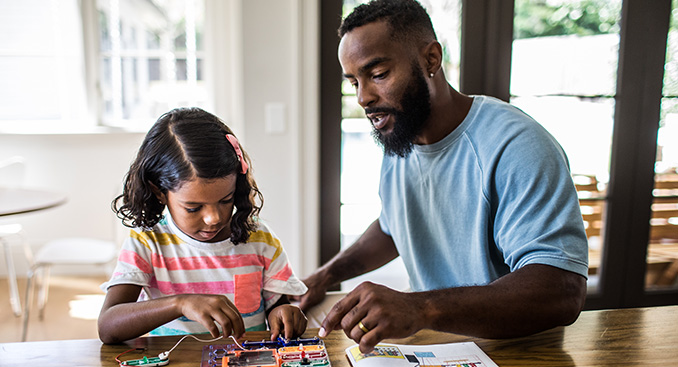TriHealth is notifying individuals whose information was involved in a recent third-party data security incident. Click here for more information. Click here for additional information on the recent Datavant Breach.
Helping Children Cope During COVID 19 and Quarantine

The sudden disruption of the family routine, lack of social and physical activity and fears related to the COVID-19 coronavirus outbreak can be especially stressful and anxiety-producing for children. The situation can be more difficult if parents are facing fears and anxiety of their own.
“Children often look to their parents or guardians and model their response to frightening situations after the adults around them,” says Margaret Lemp, PsyD, a clinical psychologist and the behavioral health consultant lead at TriHealth. “That’s why the most important thing parents can do in support of their children is to find their own methods of coping with difficult situations.”
Dr. Lemp says there are ways parents can help their children manage the stress of being isolated for a long period of time from friends, family and activities and places to which they are accustomed.
To help your children manage their anxiety during quarantine, she recommends the following:
- Help them stay connected with others - Face time or call friends and relatives, play games or puzzles together, make cards for the elderly or those who are isolated.
- Keep up their physical activity – Take advantage of nice weather to get outside and walk or play. When inside, explore online videos to dance, do yoga or workout.
- Monitor their news and social media intake – Talk to your children about how to select news with factual information and limit the amount of time they spend on media. Monitor your own use and avoid watching or listening to anything that might be upsetting when your children are present.
- Keep up their routine - Continue their normal day to the best of your abilities…same time for waking up, getting dressed, eating breakfast, doing schoolwork, taking a break, going outside for recess.
- Practice mindfulness with them to stay present - Do breathing exercises, draw, paint, sing, cook, meditate, make slime, read a story.
- Remain calm and provide reassurance - Talk about their feelings, help them reframe their concerns, let them know adults in their lives are there to keep them safe and healthy. Make sure your explanations are age appropriate.
- Keep them positive - Talk about things you are grateful for as a family or things that are going well, help them choose activities which are pleasant and improve their mood.
- Acknowledge that there is, for now, a new normal - Talk about being flexible as a family to cope with each day’s new challenges.
Building resiliency will help your children manage now and in future times of stress. However, exposure to anxiety and stress over long periods can have a negative impact on the health of you and your children. Dr. Lemp encourages you find additional support if you feel it is needed, adding that the best place to start is by calling your doctor or your child’s pediatrician.
